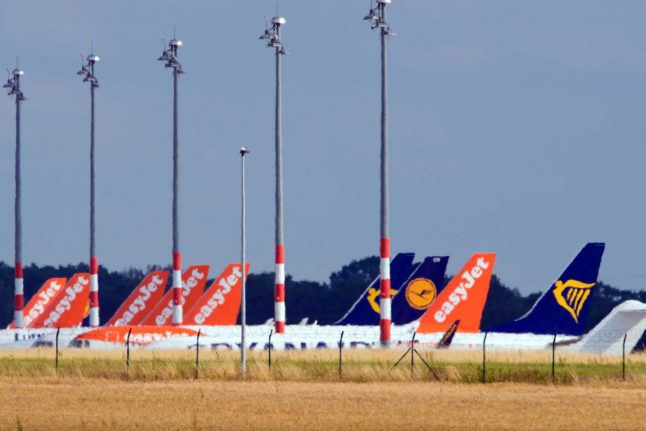According to European and German law, anyone who has their flight cancelled by an airline is entitled to a refund. The Local Germany spoke with consumer representative body ADAC to get the low down on your rights for cancelled flight tickets in Germany.
What is happening right now?
From flights being grounded to borders closing and countries refusing entry to people, there's been huge disruption to travellers due to the coronavirus pandemic.
But many passengers are still waiting to be given their money back for flights cancelled months ago, including readers of The Local.
Consumer protectors and aviation law experts agree that many airlines are deliberately delaying payments.
That's the case even after the state rescue of the largest provider in Germany Lufthansa and a new German law which makes it possible for companies to offer a voucher first.
According to the German Travel Association (Deutsche Reiseverband), tickets due for refund in the Bundesrepublik alone are worth a total of around €4 billion.
As well as passengers, many travel agencies are also pinched because they often have to wait in vain for the airlines' money, but have to cater to their own customers, said the German Travel Association. It means small firms like travel agents are struggling to survive the crisis.
Lufthansa has admitted that due to the coronavirus shutdown, bosses switched off the automatic reimbursement via the booking systems and justified this by saying they needed to examine each case individually.
READ: Customers facing long waits for refunds over cancelled flights in Germany
What is the legal situation? Can I be forced to accept a voucher?
According to EU law, airlines must refund the ticket price of a cancelled flight within seven days. Lufthansa and other airlines had, however, initially relied on offering customers vouchers.
This was called out by the EU Commission which says that people are entitled to refunds if they want them.
At the beginning of July, a law was passed in the Bundestag which means vouchers can be offered to consumers first. However, customers do not have to accept them, and can still have the money refunded if they do not use the voucher.
READ: What are your rights for cancelled events in Germany?
So what can I do if my flight has been cancelled?
Anyone who has had their flight cancelled due to the coronavirus lockdown its entitled to a refund of the ticket price. A spokesperson for ADAC told The Local that while airlines can legally offer a voucher first, “passengers are entitled to a 100 percent refund of the ticket price (in cash)”.
Importantly, this does not only apply to German or European Union-based airlines “EU rules apply for all flights originating in the EU and flights arriving in the EU onboard an EU carrier.”

Lufthansa planes grounded at Berlin's Schönefeld airport. Image: DPA
What if I am offered a voucher? When can I get a cash refund?
ADAC told The Local that while vouchers were allowed in order to take some of the pressure off airlines, customers would eventually be reimbursed in cash – if they so desired. However, they may be in for a wait.
“By accepting vouchers, customers can mitigate the effects of the covid 19 pandemic on tour operators. If vouchers aren’t redeemed by the end of 2021, customers receive a refund” the spokesperson said.
“The customer does not have to accept an airline voucher. The customer can demand a refund. ADAC provides a sample form (here)”.
What about package holidays?
With many companies in the tourism industry currently under financial strain, what if a tour operator goes under? Fortunately, “should the tour operator meanwhile go into liquidation, state guarantees secure the value of the voucher.”
What if my flight is postponed or delayed but not actually cancelled?
Not all flights were cancelled due to the coronavirus crisis – however this does not mean that people’s plans haven’t been impacted. For instance what if someone couldn’t fly due to a lockdown restriction or another state refusing entry – or Germany’s worldwide coronavirus travel warning?
According to ADAC “a travel warning is not a travel ban. If the flight is operating, “flight only” customers are not entitled for refund – in contrast to “package holiday” customers.”
For anyone who was in a forced quarantine or who had the coronavirus, there is as yet no clarification as to whether you can get a refund for being unable to travel.
What should I do if I want to book a flight soon?
Despite borders reopening, ADAC says it’s crucially important to check out the fine print of any ticket you might be thinking of booking in this post-pandemic world.
While plenty of operators now offer additional flexibility, plenty of others do not.
“Travellers are recommended to pay attention to re-booking and cancellation policies. Some airlines currently offer more flexibility with regards to re-booking or cancellation,” said the spokesperson.



 Please whitelist us to continue reading.
Please whitelist us to continue reading.
Member comments